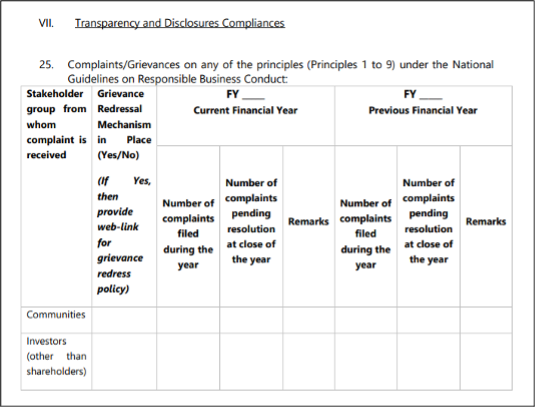One of the sub-sections in the BRSR format mandates disclosure of the number of complaints or grievances related to any of the nine Principles under the National Guidelines on Responsible Business Conduct (NGRBC) that encompass a wide range of issues. Available data indicates that more than 90% of these complaints are by customers while most investor and shareholder related complaints are against listed PSUs.
In the previous explainer, we looked at how the Business Responsibility and Sustainability Reporting (BRSR) framework, introduced in 2021, marked a significant shift in corporate reporting towards sustainability and accountability. Unlike its predecessor Business Responsibility Reporting, BRSR emphasizes both business responsibility and sustainability, reflecting global ESG standards. Changes in format, questions, and indicators enhanced the comprehensiveness of the reporting, aligning Indian reporting practices with international norms and promoting transparency and stakeholder engagement.
One of the sub-sections in Section A (General disclosures) of the questionnaire deals with transparency and disclosure compliance. Under this, details of the number of complaints or grievances related to any of the nine Principles under the National Guidelines on Responsible Business Conduct (NGRBC) that encompass a wide range of issues is sought. As seen in the previous story, these principles cover various aspects of responsible business conduct, including human rights, labour practices, environmental sustainability, anti-corruption measures, and community development.

The table compiles information on grievances received from various stakeholder groups, indicating whether a grievance redressal mechanism is in place and provides a web link to the policy if available. It presents data for the current and previous financial years, including the number of complaints filed, complaints pending resolution at year-end, and any relevant remarks.
This information disclosed by the mandated top 1000 companies by market capitalization on the National Stock Exchange and Bombay Stock Exchange websites for 2021-22 to 2023-24 has been compiled and is available in Dataful. Dataful also has a collection of datasets on other financial, environmental, social and governance-related parameters disclosed in BRSR such as paid-up capital, turnover and net worth of the companies, shares and contributions, and other details of each of the subsidiary companies, number of locations, types of business activities and products and services that are done, and information on employees and workers.
1139 companies have disclosed BRSR between 2021-22 and 2023-24
Between 2021-22 and 2023-24, a total of 1139 companies have submitted their BRSR reports. The reporting years followed by companies are not uniform due to financial year alignment, global operations, internal reporting cycles, transition periods, etc. For instance, Nestle India Limited furnished the report for the calendar year 2022 whereas State Bank of India follows the financial year from April to March. Siemens Limited follows the calendar from October to September.
Customers are the primary source of complaints
According to the data, a total of 881.45 lakh complaints were received by the companies between 2021-22 and 2023-24. Of these, nearly 793.2 lakh complaints or 90% were raised by customers. Those by other stakeholders accounted for 9.4% of the total complaints. About 1.6 lakh complaints were raised by employees or workers, 1.24 lakh complaints by other shareholders, and 1.06 lakh complaints by value chain partners. Communities made less than 85,000 complaints while investors made 63,441 complaints.
3 companies were responsible for nearly half of the total complaints reported
The highest number of complaints were reported by the State Bank of India with over 170.8 lakhs followed by Vodafone Idea Limited with 150.4 lakh complaints and Dish TV India Limited with 113.5 lakh complaints. Together, these three companies with more than 100 lakh complaints each accounted for more than 49% of the total complaints. In addition to this, there are 11 more companies which have reported more than 10 lakh complaints each. The 14 companies together accounted for nearly 79% of the total complaints. Further, including these 14, a total of 52 companies out of 1139 reported more than one lakh complaints each, accounting for more than 96% of the complaints. In short, a relatively small number of companies reported the bulk of the complaints. This could be because of factors such as market presence, type of business activities, industry dynamics, service quality issues, public visibility, and the scale of operations that play significant roles in driving complaint volumes.
Based on their major business activities, we categorized the 52 companies that received more than a lakh complaints each into different sectors. These are banking, finance, retail and consumer goods, manufacturing, power & energy, and IT, among others. Out of these 52 companies, 13 or a quarter of them are banks. Eight of these are companies involved in the manufacture/trade of electrical and electronic products such as Orient Electric Limited, Blue Star Limited, etc. Another 8 are those involved in manufacturing such as Indian Oil Corporation Ltd, Apollo Tyres Ltd, and Borosil Ltd. In other words, almost all these companies served customers directly.
Complaints by employees, investors, and shareholders were higher among public entities
Considering the numbers by the type of complainants, Vodafone Idea Limited reported the highest number of complaints by customers, followed by Dish TV India Limited and State Bank of India. In fact, almost all the complaints (99% and above) reported by over 200 companies, were those by customers.
About 50,391 out of the nearly 85,000 complaints by communities were reported by Fino Payments Bank Limited. Antony Waste Handling Cell Limited, Tata Steel Limited, Bharat Petroleum Corporation Limited, & Hindustan Petroleum Corporation Limited also reported more than 3000 complaints each by the community.
Complaints by employees or workers were the highest in State Bank of India which alone accounted for more than one-fifth. Four companies together accounted for about 64% of the complaints in this category. Among these four, two are Public Sector Banks- SBI & Canara Banks.
Among the companies that reported complaints raised by investors, 13 companies with more than 500 complaints each constituted 95% of the complaints. Seven of the 13 were either government-owned or PSUs. Similarly, among those with complaints from shareholders, more than one-third of the complaints were reported by three public sector entities.
SBI also reported the highest number of complaints by other stakeholders, contributing to nearly 80% of the complaints. Likewise, three companies accounted for over 80% of complaints by value chain partners.
Only a small percentage of complaints were pending redressal
Taking into consideration the number of complaints received, the share of complaints pending resolution was about 2%. That is, of the 881 lakh complaints received, about 17.2 lakh were pending resolution during this period. The pendency was more than 4% for complaints raised by employees and workers, shareholders, and other stakeholders while only about 0.25% were pending resolution for complaints raised by investors. State Bank of India and Shoppers Stop Limited alone accounted for about 70% of the complaints pending resolution. The majority of these were those raised by customers.
The substantial number of complaints, especially from customers, employees, and investors, underscores the need for businesses across sectors to prioritize transparency, accountability, and effective grievance redressal mechanisms, especially among public entities. It highlights the growing expectations from businesses to uphold ethical standards, address social and environmental concerns, and engage proactively with their stakeholders.



